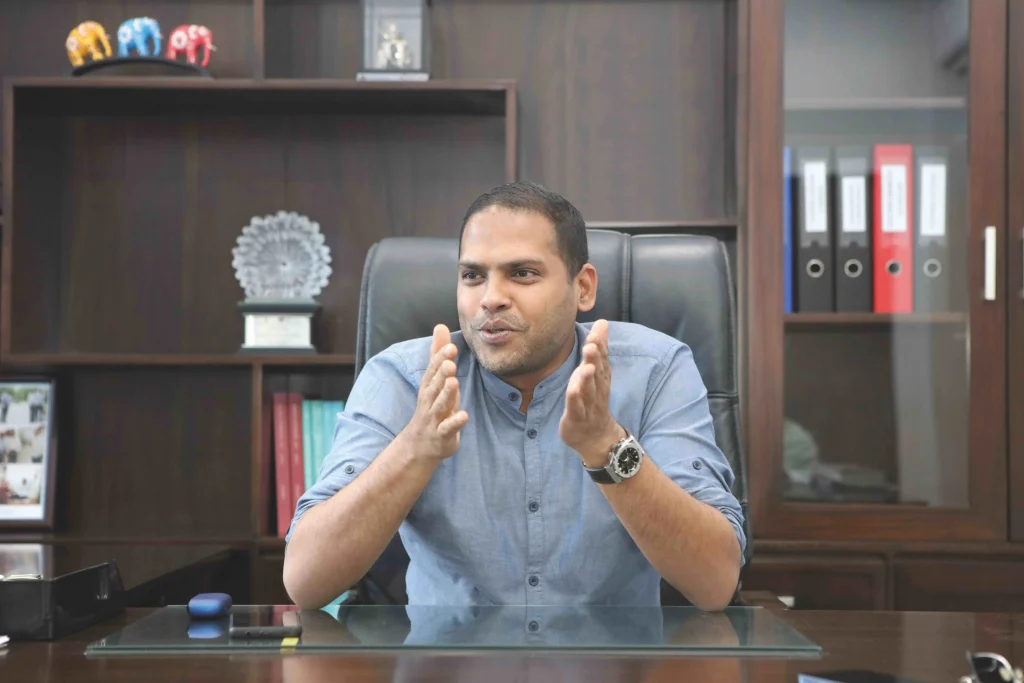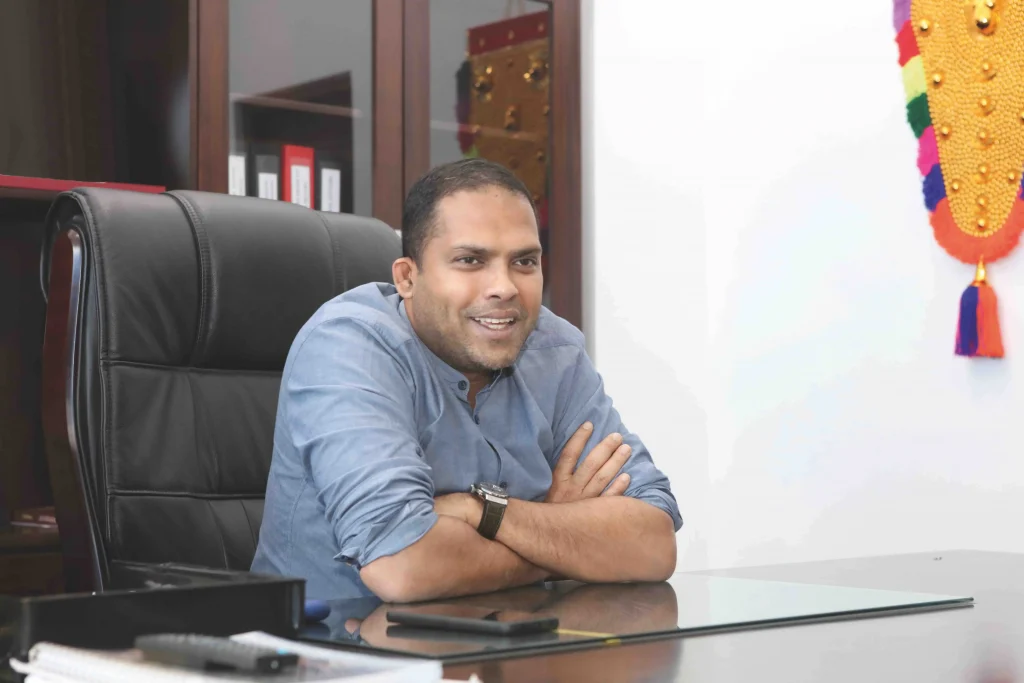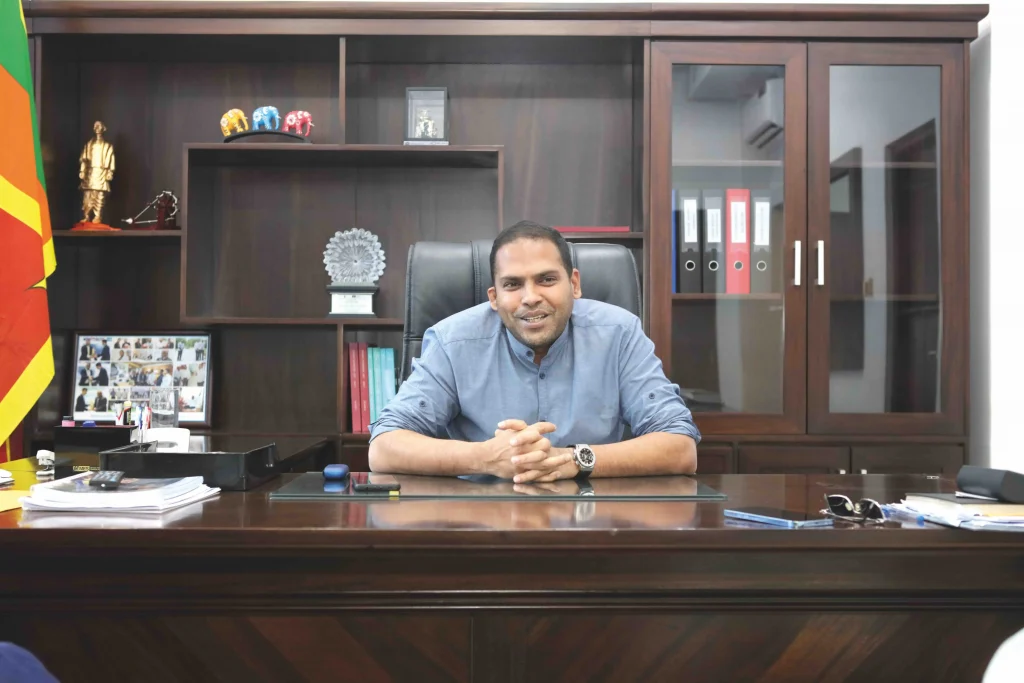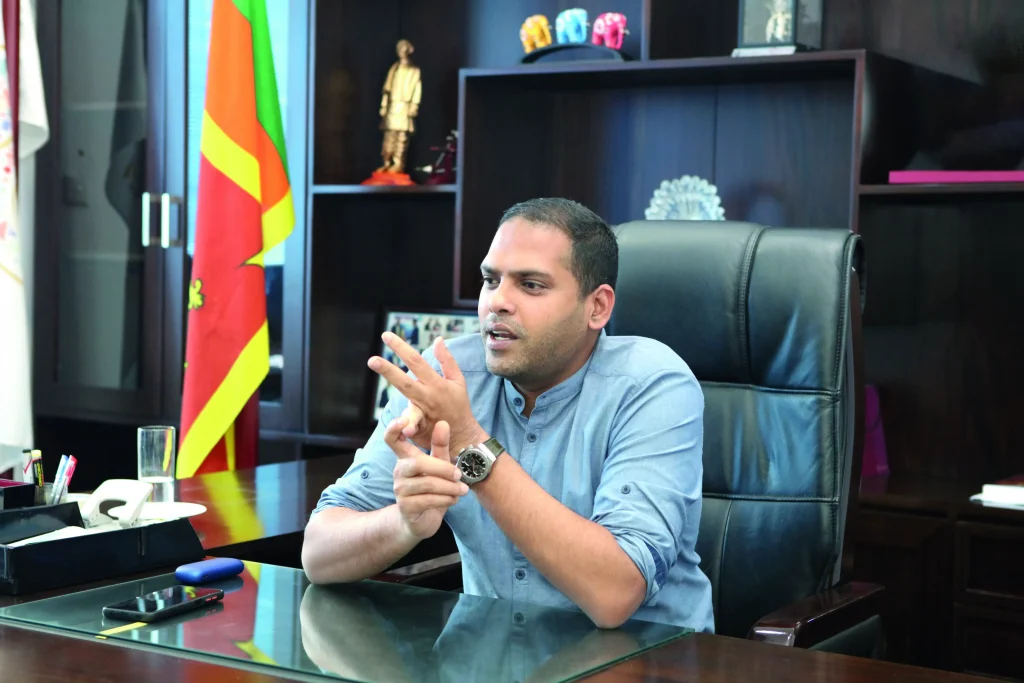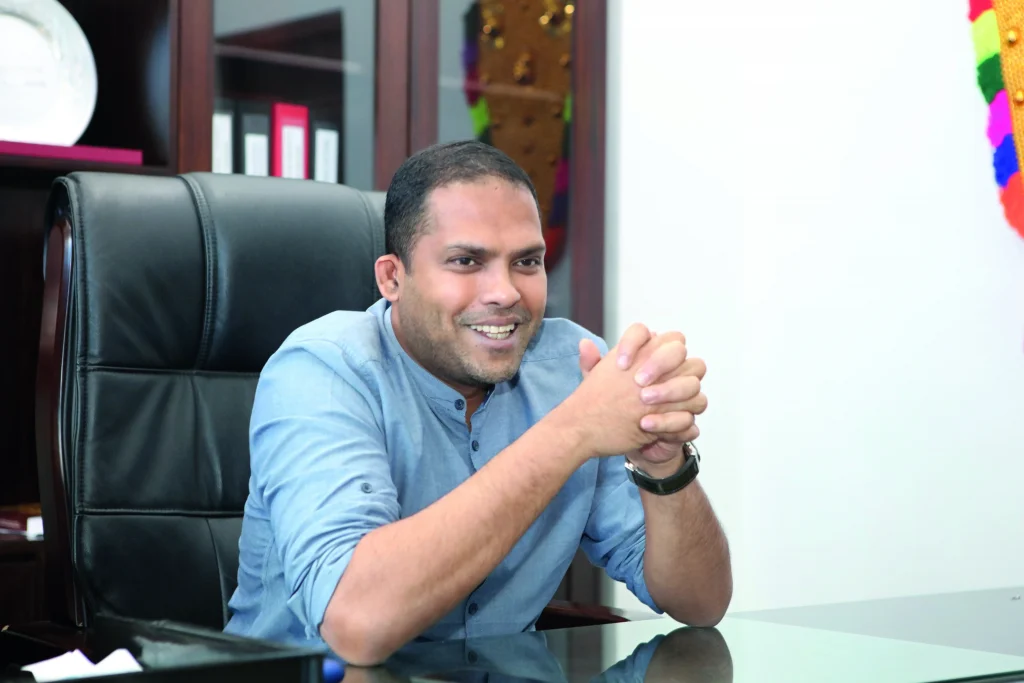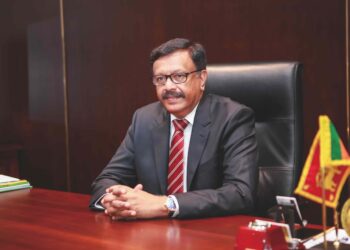Politics indeed makes strange bedfellows. One-time SJB stalwart and vocal government critic, Minister of Tourism and Lands Harin Fernando, is today cohabiting in a government he criticized. He says that a politician must have thick skin apart from being a leader. Of thick skins and weak consciences, one would agree that Sri Lanka’s political landscape is rife with proof. Once the darling of the protesting masses with daring slogans in and outside parliament, today, Harin Fernando is somewhat of a bad boy in politics.
While explaining that his move to the government was led by a desire to help rebuild the country, he also knows that he remains a pariah among the SJB voters. Despite his switch, he insists that he remains true to his values and rhetoric and takes the credit for vociferously exposing political corruption fearlessly in parliament. Today, he believes that mature politicians should be ready to work with anyone, even those they dislike while remaining true to their principles. In Sri Lanka’s political landscape, where Harin Fernando admits that the lines separating politicians, and their ideologies disappear, “alternative facts” dominate political narratives. In his defense, Harin Fernando claims that he doesn’t know his future in politics, but until it lasts, he wants to contribute to the country’s comeback. Doing politics for a living is not his style. He claims not to live and breathe politics, desiring a life outside, planning to retire earlier than his envisaged target of 60 years. Buoyant about the tourism industry’s take off amid an economic resurgence under a new presidency, Harin Fernando is a strong proponent of an all-party government and is betting immensely on Ranil Wickremesinghe to deliver as the “healing president” of Sri Lanka.
Words Jennifer Paldano Goonewardane.
Photography Sujith Heenatigala and Dinesh Fernando.
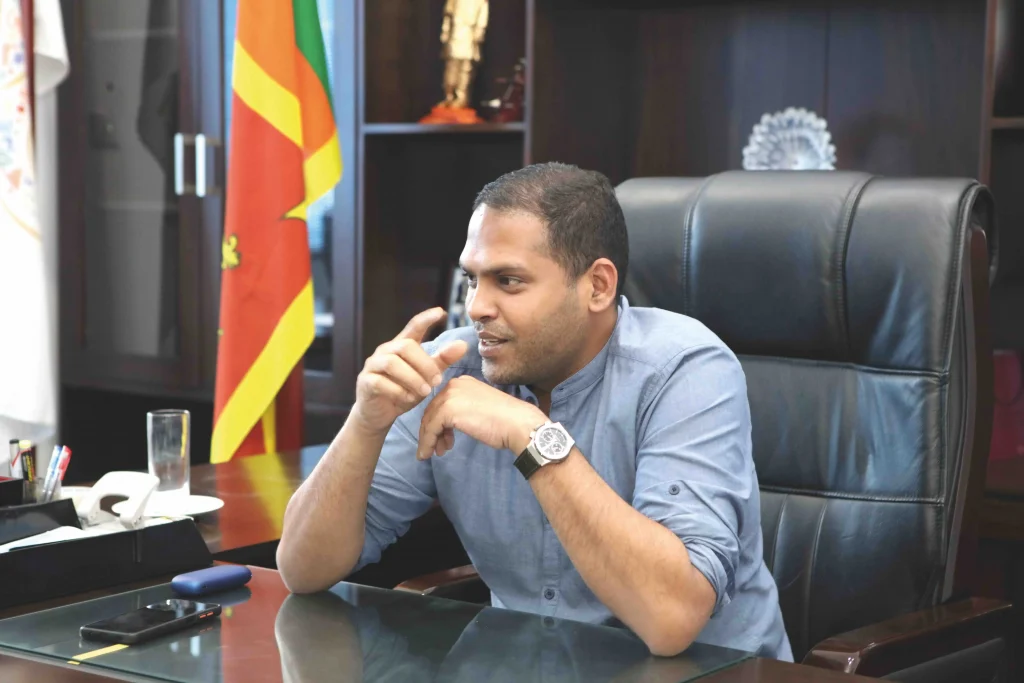
You were the live wire and vocal cords of the SJB. And then, when you switched sides, your affiliation shifted to Ranil Wickremesinghe. Again, you have become one of his most ardent backers. Why did that change happen?
As a leader, if you’re not ready to take risks, you are not suitable for leadership. Following SJB’s founding, we had the vision to come to power again. My job as Head of Operations and Deputy Chairman of SJB was to make sure we built ourselves into the next Government.
Following SJB’s launch, we gave ourselves five years to grow. However, we got the maximum results of our campaign within three months of launching the SJB, subsequently winning 57 seats in the Parliamentary Election. I was at the forefront from the beginning of Sajith Premadasa’s campaign and the SJB. I made sure he was the candidate for the Presidential Election, starting our campaign from Badulla, which saw a massive turnout of supporters for Sajith Premadasa. Ranil Wickremesinghe finally acceded to our demands to nominate Sajith Premadasa as UNP’s presidential candidate only in October 2019. However, within 30 days, beginning with a massive rally in Galle Face up to the rally in Maradana, we held 154 meetings. I choreographed and conceptualized the stage settings, the logistics, and the entire gamut of the organizational aspect of the meetings, which was not an easy task, and sometimes a nightmare. However, we had no issues whatsoever with any of the rallies. There were instances when I bore the cost of the campaign. When Ranil Wickremesinghe denied Sajith Premadasa his due place after his loss in the Presidential election, we decided to leave our grand old party, which was very painful, a move that we had to make at that point amid people’s frustrations with the UNP.
It’s not a short answer that I can offer to your question. It’s easy for people to conclude that I’m the typical politician jumping the ship. However, for me, it’s a return to the leader of my old party, whom I respect but had disagreements with how he handled the party with a few of his close associates. Within two and a half years, we were able to put up a campaign against Gotabaya Rajapaksa. “Sir Fail” was a slogan that I created. I made his maiden name “Nandasena” mainstream. “Gota Go Home” was also a slogan that we promoted. I exposed the sugar scam, antigen scam, the loss of vital data from the NMRA database, and the conspiracy behind the 2019 Easter attacks in Parliament. I still stand by everything that I said.
I organized a rally at the Presidential Secretariat on March 15. Even then, I had many arguments with Sajith Premadasa as he didn’t want to go near the Secretariat. He started from Town Hall while I began from Maradana, bringing the crowds together at Galle Face. That was a logistically challenging task, but with the support of several other MPs, I spearheaded the march. As problems escalated and the fuel crisis became unmanageable, and as Gotabaya Rajapaksa felt the heat of the people’s wrath, he invited Sajith Premadasa to accept the premiership. As I said earlier, Sajith Premadasa’s reluctance to take a decision was what led me to leave the party. Our campaign was for five years, but through sheer hard work, I managed to bring it to fruition in two and a half years, and if my leader was not ready to accept a challenge, I felt he couldn’t continue as a leader. I respect him as a brother, but I don’t see him as a leader.
I’ve been having this discussion with him often personally, over the phone, and even at group and working committee meetings. When I met him the last time after Gotabaya Rajapaksa invited Sajith Premadasa, it was a Tuesday, we were discussing until Friday, the entire day, and I felt he didn’t want to accept Gotabaya Rajapaksa’s invitation. I warned him that if that were his stance, Ranil Wickremesinghe would take it. I warned him of the inevitable and of SJB’s split and an outcome where Ranil Wickremesinghe would end up as President. He said that I could leave if I wanted to.
I said publicly that at that point, Sajith Premadasa was on the fence, unable to decide. But you can’t be like that; a leader has to make decisions. As the country was nosediving towards a crash rather than waiting until its economic collapse, it was time to get the people and the country back on track for the schools to reopen and ensure people have their basic needs, from fuel to controlling inflation. Imagine if Ranil Wickremesinghe had not come forward. Where would Sri Lanka be right now as Sajith Premadasa didn’t want to accept the invitation? The people wanted a change, but an election was not possible, and neither did the country have the money for an election. Things certainly would have gone from bad to worse. At that point, it was more than politics for me. I decided to switch sides to do something for the country, and that’s why I took over the tourism ministry to ensure that the Government begins earning foreign exchange through the industry’s revival. I know that people aren’t happy with my move. Right now, SJB supporters find me a traitor. However, I’m not a traitor. It was a decision led by a desire to help rebuild Sri Lanka.
Why was Sajith Premadasa reluctant? Indeed, he would have had reasons to reject Gotabaya Rajapaksa’s offer knowing the nuances and ground realities.
He explained that we would not be able to rectify the situation in the country in the short term. However, that shouldn’t be the response from a politician. One has to grab opportunities when one sees one. Otherwise, you lose the chance to be a leader. If Ranil Wickremesinghe turns the country’s situation around, Sajith Premadasa’s political career would be over. I warned him about it. He worried that several diplomats said they couldn’t assure financial assistance. Of course, they can’t guarantee any financial aid at a meeting, especially when they are together. At a meeting with around fourteen diplomats, none wanted to commit to what they would do by assisting Sri Lanka because they didn’t want to make their commitment public as national interests dictate their stances.
I felt that he lacked maturity in that instance. I’m not suggesting that I’m more mature than Sajith Premadasa, but I didn’t see him making decisions at the right time. His other excuse was that he didn’t have a majority in Parliament. Hence, he can’t depend on the other parties to support him. Ranil Wickremesinghe was a single member representing the UNP in Parliament, but he dared to take the bull by its horns. One has to be a risk taker in politics. The return for risk-taking is profit or loss. Hence my mantra is “higher the risk, higher the profit, lower the risk, lower the profit.”
What does it feel like to sit with individuals you criticized and individuals responsible for the state of the nation?
It’s not easy. I prefer to be with my colleagues with whom I’ve done politics for a long time and still believe I’m an SJB member. I still have Sajith Premadasa’s photographs in my office, including the hoardings; we remain together on them. I don’t know what my future in politics will be, but right now, I want to contribute my worth to help put the country back on track. That would make me very happy. After all, I don’t depend on politics for a living. I’d rather spend my time with my dogs. I want to do what I can do for my country in the time that I can and be happy somewhere else.
You said that if Ranil Wickremesinghe turned this around, Sajith Premadasa’s political future would be over. But being a savvy politician, do you think that people’s attitudes and perceptions also would change in favor of the current president, given that he is cohabiting with a group deemed corrupt?
Unfortunately, the people deem the entire 225 in parliament corrupt. It’s up to the politicians to prove otherwise. It’s easy to accuse a politician of corruption without proof. That’s what politics in Sri Lanka has become, and the media has got on that bandwagon to sensationalize events and stories, thereby influencing people’s perceptions of how they regard politicians.
I agree that there are many corrupt politicians, but then again, it’s the people who voted them in. So, one can’t blame a politician for corruption when people repeatedly vote them to Parliament. Therefore, the responsibility to overcome corruption also rests with the voter to choose wisely. We’ve seen this happening all the time, with the media promoting an individual far beyond what that person is. The people vote for that individual, and eventually, that individual is labeled corrupt. I believe all are responsible for this trend.
As I said, I’m not happy. However, I’m on a journey of not seeking happiness but embracing a mission of executing a task to ensure that we create a country where the citizens, especially the children, desire to live. On that note, I believe that I have done the right thing. As a politician, one has to have a thick skin. One cannot naively expect to work with a team from your party only while refusing to team up with individuals from opposing camps. A mature politician remains true to one’s principles yet is ready to work with anyone, even those you don’t like, if the situation demands that from you. I believe that is a huge opportunity and learning curve for a politician. While we remain true to certain values as political parties, I don’t think there is a straight-line separating leftist and rightist politicians anymore.
In general, Sri Lankan politicians are more right- leaning, and the UNP, SJB, SLFP to SLPP are pro- right, and if you ask what separates us, I don’t see a difference. I find SJB politicians more educated and people-savvy and better in many ways. On the other hand, there are quite a few young parliamentarians in the SLPP who are brilliant, and I’m delighted to work with them. Some of the state ministers in the previous Government and individuals like Kanchana Wijesekera are fantastic workers. I would love to have Harsha de Silva and Eran Wickramaratne on the team. You see, even when we win on the SJB ticket, we may have to work with specific individuals we don’t see eye to eye, but that doesn’t mean that one refuses to accept a position. Rather it’s better to accept a place and try doing what you can to the best of your ability.
My current position doesn’t give me any benefits. I have not used state money to fund any of the trips I have traveled as Minister of Tourism. They were sponsored by those who invited us, or we have personally borne the cost. I did the same with my ministry from 2015 to 2019. I hadn’t taken a single cent out of the Government. But people don’t appreciate it. I don’t eat from the Parliament cafeteria, take fuel or a salary as a Member of Parliament or Minister, but people fail to speak about what we do. Sometimes it’s annoying to witness the rampant use of social media for attacks. Like Ranil Wickremesinghe, I refuse to use a phone to watch such content. I’ve blocked social media responses, stopped watching such stuff, and given that responsibility to my media secretary. That way, I’m focused on my job.
You’ve come to Parliament on the national list. What if I say that your move to join the Government and take up a ministerial portfolio is strategic because you are calculating your winning chances two years from now on?
My votes have been increasing at every election that I have contested. When I contested the provincial council election just ten days after the war’s conclusion, the Mahinda Rajapaksa-led alliance was so popular, despite which I secured 39,000 votes out of 50,000 by the UNP in the district. At the subsequent Parliamentary Election, the UNP managed to secure only 75,000 votes, out of which I secured 49,000 votes in the Badulla district. I got the highest votes in both polls, over and above many seniors contesting from the district. I came first, beating five Cabinet ministers in the district.
In 2014 I took a risk by leaving Parliament because I wanted to unite the party as one of the worst clashes was happening between Sajith Premadasa and Ranil Wickremesinghe. At the last Provincial Council Election, Shashindra Rajapaksa secured 93,000 votes, and I got 173,000 votes while winning four district seats. I secured 200,000 votes at the 2015 Parliamentary Election out of the 225,000 polled votes. Mahinda Rajapaksa secured the highest number of votes in the country, I was second, and number three was Ranil Wickremesinghe. Had I contested in 2020, I am confident I would’ve secured a minimum of 100,000 votes because the wave then was for SLPP.
I decided to switch districts and came to Gampaha. In the meantime, Sajith Premadasa wanted to contest from Colombo, and I had to handle his campaign. Also, since I had hitherto contested from Badulla moving to Gampaha all of a sudden, the Wattala electorate would not pay off immediately. Subsequently, I decided to come on the national list. I’ve invested a lot in the party especially organizing the election campaign, which many don’t know. Many people don’t know the truth behind my decision not to contest the last Parliamentary Election. Many assume that I was afraid to contest as I feared securing lower votes than before. However, I’m confident of my popularity because even those less popular than me made it to Parliament. I decided to switch districts because I want to ensure the defeat of Shashindra Rajapaksa and Basil Rajapaksa in the Gampaha district. The difference in the voter base was vast, with 1.7 million voters in the Gampaha district to 600,000 voters in the Badulla district. For Sajith Premadasa, it was 300,000 voters in Hambantota to 1.6 million voters in the Colombo district, which is a massive difference. Those decisions were strategic.
Although I’m in the Government, I don’t believe I have left the SJB because, suppose members of the SJB decide to accept Government positions in the future, we all fall into the same boat. Sajith Premadasa gave me his blessing to leave if I wasn’t happy. He told me to join any party if I thought he was wrong. He promised not to take any action. But he did take action. He has already appointed someone else to the Wattala electorate, which I consider somewhat petty a move. I believe Sajith Premadasa has a lot to learn from Ranil Wickremesinghe, like how he tapped me all along, knowing that he could take out the biggest strength of the SJB.
I was passionate about my role in the SJB, but I was sad when Sajith Premadasa was adamant about not accepting a post in the Government. I witnessed more childish behavior when he found out that Ranil Wickremesinghe was taking oath at six in the evening he wrote a letter to the then president because he knew I was livid and I wouldn’t want to meet him. Still, I went back for a few meetings and told him that he still had the opportunity to take up a few ministries. I said that I didn’t want to accept any ministry. I also advised him to nominate five people and help in the task of rebuilding the country. I requested that he allow the likes of Harsha de Silva, Eran Wickramaratne, Kabir Hashim, Madduma Bandara, and a few others to accept ministerial portfolios and help the country stand up. He didn’t want to do it, and I was very disappointed. It was in deep hurt that I decided to leave.
But don’t you think Ranil Wickremesinghe used people like you to realize his lifelong ambition of becoming the president of Sri Lanka?
As a politician, you need to use people. Had I been in Ranil Wickremesinghe’s shoes I would’ve done the same thing. And I believe Sajith Premadasa does the same thing in a mellower manner. As a politician, one has to be aggressive and intelligent to tap the right people for your team. If Sajith Premadasa had realized that, he wouldn’t have let go of me. The way he was trying to stop me was through friendship and emotions. My brotherhood to him will remain, but one has to be strong for political leadership, someone who’s ready to take risks, and at this time, we shouldn’t have thought of our agendas. I would’ve taken the risk, win or lose. You could always go to the people to say that we took the chance for their sake. Even if you don’t do well at your task, when it comes to an election, he could always say that he was carrying forward the follies of the previous Government purely because he loved the people. However, he didn’t want to do that. He wanted the mandate to go to the top. Who needs a mandate when the country is on the brink of collapse? I think he miscalculated the situation and made a wrong judgment.
What will happen to the people’s struggle of which you were a part?
I am for the “Aragalaya,” but we must engage in any struggle with maturity. I managed to invite the Aragalaya youth to the President’s office, and I have asked the President to recruit 25 of them. Our objective was to make a change, which we achieved, and we have to make sure that we move on from now.
Now that you are cohabiting with SLPP closer to an election, these people may change their rhetoric and return to chauvinism. You’re not one of them, isn’t it?
That’s a challenge, but today the President is Ranil Wickremesinghe. The problem is that Ranil Wickremesinghe, Manusha Nanayakkara, and I are the only people on one side, so we depend on the others. We’re genuine and want to do what’s right. There may be a split, and many may return to their old behavior, but I still feel the majority will support Ranil Wickremesinghe. The President has to lead from the front, and he has to say what to do and communicate it effectively. The majority in parliament was with Ranil Wickremesinghe at the time of voting. Nearly 10 to 14 SJB members also voted for Ranil Wickremesinghe. Ranil Wickremesinghe will not secure a two-thirds every time, but he will always get through the 113.
Weren’t you one of the euphoric people who expressed joy openly when Ranil Wickremesinghe won the vote in Parliament?
It was an exciting situation. It was more stressful to sit and watch while the counting was going on. The night before was also very stressful and restless as I mulled my decision, wondering whether I had made the right choice. I asked a few family members and relations whether the outcome would be on our side, and they told me that now that you’ve taken a decision, you’ve got to face it. I thought that I’d still have a different option to work with, even if I didn’t make it. At the hundredth vote, I knew we had more than half. Of course, the numbers kept increasing. So, when we had reached 110, I put my hands up to show that we had gotten through. There was much joy. Sajith Premadasa was seated next to me while the counting was going on, and I turned to him and said, “lost.” What surprised me was that the other side assumed they had won before the election. They had been preparing for victory and had even spoken with the prime ministerial security division and got their details organized which again proved to me that they were not fit enough to be in that position.
Time will tell, and I believe that their split is inevitable if the SJB doesn’t join this Government in an all-party government as invited by Ranil Wickremesinghe. That split will not allow Sajith Premadasa to survive. I still believe that if he’s mature enough, he needs to show some action rather than keep talking and coming back to the same stance. The country needs an all-party government. They want to ride the political wave, and when unpopular things happen to come to power by toppling the Government.
Now is not the time for an election when the country is facing the worst economic crisis in its history and we are all responsible, including media institutions that played a significant role in bringing certain people into power. Media institutions are responsible for blindly supporting and promoting absurd gimmicks in the run-up to the 2019 election. Like the snake emerging out of the water and claiming it to be a sign of Gotabaya Rajapaksa’s victory were cheap tactics adopted by the media. Of the voters, 6.9 million voted for Gotabaya Rajapaksa, which shows that many people are part of the problem. Therefore, if we look at ourselves as part of the problem, we can find a solution together. Politically we have been divided during the worst crisis in our country, including the war and the JVP-led insurgency. The worst character in our politics is that we have consistently failed to unite in a situation. The JVP never wants to join an alliance. They want to be the troublemakers and try to garner anti-government votes. But that doesn’t help the country. At a time like this, if the JVP, SJB, and the other parties come together, there will not be corruption as the top members of every party will be in the cabinet, ensuring that it’s everyone’s responsibility. Sadly, Sri Lanka hasn’t realized it.
You spoke a lot about being genuine as a politician. But when you talked about Ranil Wickremesinghe’s victory now, your joy was on display, which means that you’re like everyone else, just making deals in politics.
It’s more than deal-making. It’s more to do with what we believe in as politicians. I chose a side that was right at that point. True that the former Government was also trying to find a way out and remain in power. What are you to do if your leader doesn’t want to take it? I was with the SJB pushing him to take up a post in the Government, pleading and crying before him. Am I to sit there and criticize the Government like my colleagues are? Or take the plunge into the deep end and try to swim out? I took a decision that was not the most popular, but I took that decision for the sake of the country. What good am I getting out of this? Only blame. But I will show my performance in six months. I think risk-taking is the best thing to do in politics.
How do you think people will respond when you go to the electorate for their vote? After all, you have openly pronounced retiring at 60.
I can’t speak about my future as the opposition voter base elected me, but now when I go out, I realize that I still have a voter base on the Government side. I was a very vocal individual among a tiny voter base, but now I have the support of the SLPP voter base. Now I’m very vocal among the majority. I realize this is how people whom crossover to the majority side win at elections. I’m not focused on re-election. I believe that if I fail in this journey, I don’t want to contest again. I have a better life outside politics. I’ll do my best as long as I’m the Minister of Tourism and Lands.
Every Government employee has an age to retire, so why not politicians? I gave an affidavit to Sajith Premadasa that I would retire from politics at 60 years. But now I don’t feel like staying on until 60. I already feel like quitting at 50 years. Politics is stressful even though people think otherwise. Dealing with day-to- day issues in the electorate and the ministries make you age faster. I’d rather have a good ten years after 50 and enjoy life. I entered politics at 26 years which kept me away from my family and home. I didn’t see my children growing up. It’s a bit of a loss for me as well.
As you just said, if you dislike politics so much, why did you get into it?
I got into politics to teach my father a lesson because I wanted his respect. I knew I wouldn’t be able to excel in business as he did in his lifetime. The next best thing to earn his respect was to enter politics. Maybe my decision was wrong, but, in the end, I realized how many people depend on me. I still remember when I won the election, my father called me to tell me that all this while people knew me as Nihal Fernando’s son, but from then on, people began calling him Harin Fernando’s father. I was driving at that point. I just stopped and let out a euphoric “yes”. I think I got the respect and acceptance I was looking for from my father. I even told my sister that I didn’t want to do politics, but at least I got what I wanted. By then I was too deep in politics and was responsible for the people depending on me. So, then I decided to make it my journey and continue in politics. I don’t think I want to be in politics permanently.
You have said that you want to see the SJB and the UNP ultimately uniting. Aren’t they more compatible?
They are compatible. The only individual blocking it is Sajith Premadasa. Everyone else wants to join. Many want to stay together as a single party. I told Harsha de Silva that I had crossed over to the Government to open the door and create a bridge for them. Even in 2014, Sajith Premadasa didn’t attend any campaign rallies. He had to participate in one of my rallies when my campaign was at its peak. I still remember the date as September 6, 2014, when I organized a massive rally in Passara. At that stage, I brought together the UNP to demonstrate to the people that we were a united party. Sajith Premadasa’s political career would have been over if he had kept away that day. Every time I’ve taken a risk or challenge, I’ve won it, and I think my decision to serve in the Government is also one such right decision. If I can unite the two parties at some point, I’ll be the happiest.
But if Ranil Wickremesinghe was a divisive factor in the UNP, how can he unite all the factions now?
The decisions that he makes with the power that he has as the executive will make him realize a lot more than when he was out. Our issue was not regarding Ranil Wickremesinghe’s capabilities but his way of handling things, where he would be supportive of a select few and didn’t give people their due place.
As with the SJB and the UNP, let me tell you that the SJB constitution is worse than the UNP. I also fought on that with Sajith Premadasa, keeping away from meetings until we reached a compromise regarding certain sections. Now I know that all leaders in politics don’t want to leave. They want to consolidate their positions and stay as long as they can. I’m entirely opposed to it, but who knows what I’ll do if one day I’m thrust into the position of leadership. However, I don’t think that would happen as I’ve come from a place where I have a life outside politics.
Now that you are in the government and listening to you speak confirms that there are no permanent friends or enemies in politics. You were once a vocal critic of the Rajapaksa clan. Has anything changed now?
I haven’t taken a step back from my earlier stance. I laid down seven conditions to join the Government. One was to investigate the Easter attacks with international support. Ranil Wickremesinghe has said that he intends to speak with Scotland Yard. I have been championing justice for the victims of the Easter attacks. No one talks about the Easter Sunday attacks anymore. The other demand was Ranjan Ramanayake’s release. Ranil Wickremesinghe wanted to handle his release the right way rather than use his executive power to sign his release letter. The 22nd Amendment to the constitution is another critical condition I want to see implemented by Parliament. My decision to join the Government will be vindicated if at least five of the seven conditions come to fruition.
Namal Rajapaksa is my friend although we were on the opposite side of the aisle. We share a common interest in rugby, which has made us good friends. I still think that he did a fantastic job as the sports minister. I can’t criticize every individual who is a Rajapaksa. I have been critical of the Rajapaksas over their involvement in some issues. We have our arguments too. Namal Rajapaksa is a younger generation politician and seems to have a better grasp of the ground, unlike his father and uncles. However, as they say, you need to put them in the hot seat to see whether they melt or not. Many keyboard warriors will narrate stories, but once they get on the side of the Government from the opposition, they are not the same. Governance is a tough job.
You are pretty buoyant about the tourism industry bouncing back. You had said that Sri Lanka has $900 million coming from the tourism sector, hoping that by the end of the year, it will reach about $2 billion and that the country hopes to end 2022 with one million tourists and the next year with one to two million tourists.
We are on the right track regarding tourism promotion, and by December, I’m sure we’ll achieve our target, and 2023 will be a successful year for tourism. We are trying to change the industry’s red tape and rigid regulations to enable seamless functioning. We successfully obtained a moratorium for industry operators after I took over as tourism minister. We have done a lot in a short time. I’m pretty optimistic about getting many things done for the industry.
We have only 40,000 rooms in Sri Lanka. I recently met representatives of the Sri Lanka Tourist Bus Owners’ Association and learned that we have only 500 buses. We can’t get more than 20,000 for an event with that number. Some people lament that the Asia Cup is not happening in Sri Lanka. The R Premadasa Stadium has a capacity of 40,000, and if we bring down 40,000 Indians and Pakistanis for the event, we don’t have enough vehicles to transport them. It’s easy to criticize, but the ground reality is different. Until recently, we had a fuel issue as well. We need to take a step-by-step approach to overhaul the industry.
We are identifying training needs in the sector and new locations in the country. Sri Lanka has places that we haven’t exploited until now. We are seated on a treasure and still begging. We fail to realize and appreciate our country’s worth. With that in mind, with European Union funding, the Sri Lankan UNDP conducted a ‘Rapid Assessment on the Impacts of COVID-19 on the Tourism Sector’ to help the sector recover and be resilient. One of the new projects we have launched is the Peak-o-Trails, which identifies a collection of destination-based walking trails across the island, starting with a more than 300-kilometer walking path crossing famous hiking mountains. I want to ensure that this project takes off soon so that tourists have more to explore and experience. We have identified sites in every province. Some of them are so breathtaking that it’s hard to believe that Sri Lanka has such beautiful places. What’s important is that we’re more than a beach destination and must look beyond that. We have much history, culture, and culinary art. We’re unique and dynamic, but our approach must be very modern. I’m focused on encouraging Indians to travel to Sri Lanka. Right now, the most significant arrivals are from India, and they mostly patronize the casinos, which means their stays are limited to two to three days. My first foreign trip as tourism minister was to Gujarat with Sanath Jayasuriya. Gujarat is the state with the most significant number of travelers, but unfortunately, Sri Lanka tourism doesn’t have an office there, which is a considerable lapse on our part. Our tourism promotions in India were limited to Mumbai, New Delhi, Bangalore, and other cities in South India. So, the Gujaratis mostly travel to Singapore, Malaysia, and Thailand, which they’re tired of, and this is the opportunity for Sri Lanka to tap that market. Sri Lanka has something to offer everyone, from a pilgrimage to a religious festival to hiking and biking. I’ll be traveling to Kerala in September to invite three ashrams to set up branches in Sri Lanka. We will also be launching a ferry service starting from Pondicherry in September. There’ll be ATR Aircraft coming to Jaffna soon. With so much happening, I envisage a boom in numbers.
Your projections mean that large groups of tourists will travel the country. Do you think we have the infrastructure and other amenities in place?
Our tourism industry has come thus far because of private investors who love Sri Lanka. Successive Governments haven’t done much for the industry. I’m very excited to work with Ranil Wickremesinghe because he understands every situation and is quick at grasping it. I’m aware of the urgency to correct a lot of grey areas. We have to improve the toilet facilities, especially in the railway stations. We need to identify locations for conservation and promotion. For instance, many are unaware that Geoffrey Bawa designed the Bentota railway station. However, no one has taken steps to conserve it.
We need a blueprint on how we operate the industry, like who builds a toilet and maintains going forward. The necessary institutions have to take charge at each stage. I’m keen on establishing a policy for the industry that remains unchanged despite the Government in power.
We need a ten-year plan to reach our targets, such as augmenting arrivals and revenue generation. Our best year was in 2018, when there were 2.3 million tourists. I want to make sure before I leave my position as tourism minister to surpass that number.
Do you agree that Sri Lanka’s tourism is unimaginative? Our sales strategies are described as mediocre by industry veterans, and so are the people leading innovation from the forefront. Still, for all, Sri Lanka spends colossal sums of money on overseas promotions but to no avail.
We have been promoting Sri Lanka in faraway destinations when we could have done so in the region. Tourism is not only about white-skinned people. Anyone who travels is a tourist. A tourist could be any person of any color. Our concept has been wrong from the start. Limiting tourism to Europe is old school. Some industry veterans still think along those outdated lines.
Given Sri Lanka’s abundance and diversity, we need a dynamic marketing strategy. We spend millions on road shows and promotions. It’s no mean task. However, we didn’t pay a cent on our tour to Gujarat. Our sponsoring company has invited the travel agents in Gujarat that attended our presentation to travel to Sri Lanka on a chartered flight which will be one-tenth of the cost of having a roadshow in India. We must depart from conventional advertising and transfer that task to bloggers, Instagrammers, and social media influencers. Our officers are not used to modern promotional methods. I believe I have a mix of the old and the new way of thinking, which might help to change their thinking.
What are your plans for the ministry amid a challenging environment?
As we’re a MICE destination, we will focus on developing it to harness better contributions from that segment. The Sri Lanka Convention Bureau focuses on developing MICE tourism. The Sri Lanka Tourism Development Authority is in charge of planning, developing, regulating, and implementing policy for the industry and sectors. Sri Lanka, Tourism Promotion Bureau, handles marketing and promotional activities. We have launched a program to send students enrolled with the Sri Lanka Institute of Tourism and Hotel Management for overseas training on scholarships, and 25 students will be leaving to work at Radisson Blue Hotel in Qatar. They will be paid 150,000 rupees with accommodation and food. We’re trying to work with a Swiss company to give accreditation for the hotel school so that their credentials improve for foreign travel and employment.
I have a young, energetic, and enthusiastic team working for me. Earlier, a single individual handled four institutions’ entire gamut of operations. I was baffled when I heard that a single individual was running four institutions, as that’s impossible. It was more like wanting control of everything. What we have done is allocate designated jobs with KPIs. I’ve told the heads of those institutions to cut costs by 50 percent even if they travel overseas. We’re going through a crisis; hence, we must cut costs and think together. I want the chairpersons to help me for six months until we weather this storm. We’ve taken up a challenge and want to perform; hence, we have come together to work. I’m very optimistic about the outcome.
As the minister of lands, can you tell us your role and what sort of urgency prevails in that area amid the economic crisis?
One of the reasons I wanted the ministry of lands is because there are two million deeds to be handed over to people. We have started that process and have already given deeds to 10,000 people. The state’s failure to provide deeds has caused people to endure many issues in their life, like getting their children a school. The President has instructed us to make them a freehold deed enabling them to access financial institutions for assistance. Within two months, Ranil Wickremesinghe wants to ensure they become freehold lands. Investment promotion is also a priority. We have much valuable land for investment in power generation projects such as solar and wind power. We also need to provide land for investment in food cultivation for future food security. This way, we can reduce our dependence on imports. Lands are also vital in tourism promotion, especially to promote wellness, and ashrams, for investment in various activities and events.
In 2014 when you handled the UNP campaign, you were the youngest person to do so.
I did so against a formidable force. I’m happy that we managed to get 5.5 million voters on our side in the 2019 Presidential Election, and that was because of the campaign. The entire concept I created, from the lighting and positioning to the sounds, was my idea. We had a vision that we never changed. I like to take ownership of the campaign because, in some instances, I had to incur the cost to suppliers personally. Creating ideas and organizing events is my specialty.
How do you feel working with Ranil Wickremesinghe?
I want to call Ranil Wickremesinghe the “Healing President”. At this juncture, he needs to be a healing President. I believe Ranil Wickremesinghe came to heal this country when we were wounded emotionally, physically, and financially. His job is to heal Sri Lanka. In that quest, he must be accommodating, which is why he has been pleading for an all-party government. You can’t heal this nation if all the lawmakers don’t come together. All political parties in Sri Lanka must contribute to healing the country and help the healing president.
So, is Ranil Wickremesinghe a misunderstood leader?
He was always a misunderstood leader, so he wasn’t voted for President. I now believe there is a right time for everyone and everything after Rail Wickremesinghe took over the presidency at 72 years.
How do you see the future?
The farmers are getting their fertilizer, and now with cultivation taking place, we will have a harvest next year. Six months ago, everything seemed impossible, spelling near doom, but right now, we are getting over the issues one at a time despite the political crisis brewing. I believe we’re heading in the right direction.
